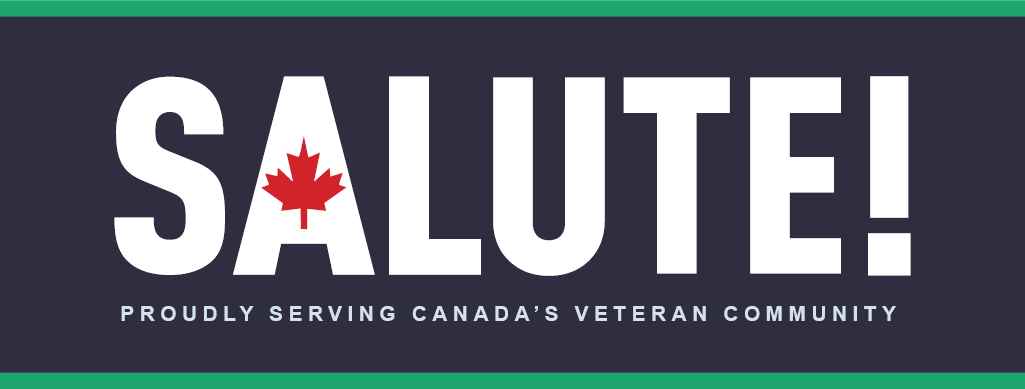In this edition:
- News
- Repatriation of an unknown Newfoundland First World War soldier
- Pilot program: New peer support group format for individuals who experienced sexual misconduct
- Programs and services
- Public Service Commission addressing issue impacting mobility and preference entitlement for CAF Veterans and members
- Experiencing operational stress injuries? Support is available
- Veterans' stories
- Bruno Plourde: How to adapt to life after service
- Commemoration
- Southern Chiefs Organization invites you to celebrate and support First Nations Veterans
- Vimy Ridge Day
- Countdown to the 80th anniversary of D-Day
- RCAF centennial celebrations set record
- International Day of Reflection on the 1994 genocide against the Tutsi in Rwanda
- First of its kind Veterans delegation commemorates 2SLGBTQI+ soldiers who served in First World War
- Commemoration calendar
- Engagement
- Women Veterans share challenges, successes at annual Forum
- National Stakeholder Summit brought together Veterans and stakeholders
News
Repatriation of an unknown Newfoundland First World War soldier
This year, Canadians have the opportunity to recognize and remember Newfoundland’s unique place in our military history.
On 25 May 2024, the Government of Canada will repatriate the remains of an unknown Newfoundland First World War soldier from northern France.
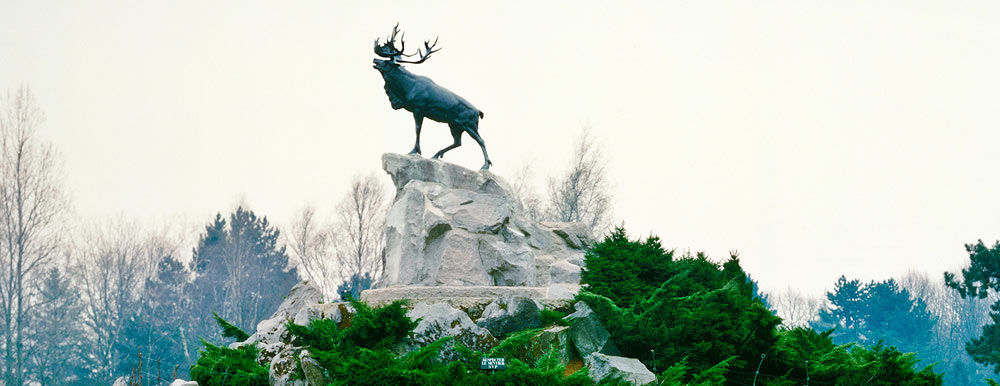
The remains of an unknown Newfoundland soldier will be repatriated from a site in northern France and reinterred in a new tomb in St. John’s, Newfoundland and Labrador. Large bronze caribou monuments at Beaumont-Hamel, in Newfoundland and Labrador and at other sites in Europe honour the service and sacrifice of Newfoundland soldiers.
On July 1, as part of the ceremony marking the 100th anniversary of the Newfoundland National War Memorial, the Government of Newfoundland and Labrador will unveil a new tomb at the Newfoundland National War Memorial for the remains of an unknown soldier. This tomb will symbolize Newfoundlanders and Labradorians from all branches of service who have no known grave.
During the First World War, Newfoundland was a separate dominion of the British Empire and not yet part of Canada. Once Britain declared war on Germany in August 1914, Newfoundland—like Canada—was automatically at war. Its soldiers served primarily in the Newfoundland Regiment.
Veterans Affairs Canada, the Royal Canadian Legion–Newfoundland and Labrador Command, Canadian Armed Forces and the Commonwealth War Graves Commission support this initiative with the Government of Newfoundland, to commemorate the soldiers who did not receive the proper burial they deserved.
For information about events in France and in Canada, visit the Repatriation of an unknown Newfoundland First World War soldier web page.
Pilot program: New peer support group format for individuals who experienced sexual misconduct
Based on feedback through the sessions held to date, the Sexual Misconduct Support and Resource Centre (SMSRC) will offer informal peer support group sessions that will provide a unique opportunity to connect and heal among peers in a confidential, virtual environment. Anyone who has experienced sexual misconduct or Military Sexual Trauma (MST) is invited to contact the SMSRC to participate in these pilot sessions.
The revised pilot program will consist of eight 90-minute, group drop-in sessions through Microsoft Teams. Both English and French sessions will be available, facilitated by two trained peer supporters who have personally experienced sexual misconduct or MST. The program is being offered in partnership with Veterans Affairs Canada.
For those who prefer a more structured approach, SMSRC also continues to offer formal peer support groups. A trained peer supporter and a mental health professional lead these closed educational sessions, exploring themes related to the participants' experiences and the healing journey.
SMSRC provides support to serving Canadian Armed Forces members, Veterans, current and former National Defence public service employees, Cadets and Junior Canadian Rangers affected by sexual misconduct and their families, aged 16 and older.
If you are interested in participating in a peer support group or want to learn more, please email the Peer Support program. You can also contact the SMSRC 24/7 line at 1‑844‑750‑1648 to be referred to the Peer Support program.
If you have experienced sexual misconduct or MST, you can get immediate support by calling SMSRC’s 24/7 line at 1-844-750-1648. You may also be entitled to benefits and support; visit our Mental and physical health page to learn more.
Programs and services
Public Service Commission addressing issue impacting mobility and preference entitlement for CAF Veterans and members
The Public Service Commission of Canada (PSC) has identified an issue affecting Veterans mobility and preference entitlements in the GC Jobs system.
If you are a Veteran with mobility and preference entitlements, you may not have been able to view and apply for jobs with the federal public service through your GC Jobs account between 13 November 2020 and 19 January 2024 due to a technical issue. Similarly, if you applied to one or more jobs open to the public using your GC Jobs account during that period, you may not have been properly identified as having a preference for appointment on your job application.
Veterans with at least three years of service in the Canadian Armed Forces (CAF) who are honourably released are provided with a mobility entitlement. This means they can apply to jobs otherwise open only to federal public servants. Veterans are also given a preference for hiring ahead of Canadian citizens and permanent residents when jobs are open to the public. These entitlements normally automatically apply in the GC Jobs system; however the issue may have resulted in some Veterans not being properly identified by the system.
You should be able to view these opportunities now. Please log in to your GC Jobs account and check that the job search page includes a separate tab called “Internal jobs” in the “Search results” section. If you can’t see the tab once you’ve logged in, please complete PSC’s Contact us form.
The PSC is currently conducting a review to identify the Veterans who were impacted by the issue and to provide solutions. They will contact those who were affected as more information becomes available.
If you have any questions about the issue, please reach out to the PSC.
For more information about entitlements and access to jobs for Veterans and active CAF members, please visit the Canadian Armed Forces members and Veterans page.
Experiencing operational stress injuries? Support is available
If you’re a Veteran, a serving member of the Canadian Armed Forces, a member of the RCMP or a family member, you can turn to operational stress injury (OSI) clinics across Canada, for in-person and virtual assessments, treatments, and supports to address mental health issues related to service. Each clinic has a team to work with you to identify therapeutic activities and individual goals to improve your quality of life.
VAC supports a network of 10 outpatient OSI clinics and 11 OSI satellite service sites across the country, operated by provincial health authorities. Clients have access, through referral from VAC, the RCMP or the CAF, to an interdisciplinary team of psychiatrists, psychologists, social workers, mental health nurses, and other experts who provide them with mental health assessment and treatment services. The services offered include individual, group, and family interventions, offered in virtual or in-person format. If you want to be referred to an OSI clinic, please contact us.
Since 2001, Operational Stress Injury Social Support, a peer support program offered to Veterans, serving CAF members and families, has grown in response to their needs. Its peers and coordinators live with OSIs and are at a point in their recovery to be able to help others going through similar experiences. Confidential, one-on-one meetings and group sessions are available. For more information, write to Operational Stress Injury Social Support or call 1-800-883-6094 (toll free).
At any time, mental health support for Veterans and their families is only a phone call away. Call the VAC Assistance Service toll free: 1-800-268-7708 or TDD/TTY: 1-800-567-5803. Using their online chat service, you can set up an appointment at your convenience. Be sure to select the required option that describes you best: current, former RCMP/CAF member, or family member.
Veterans' stories
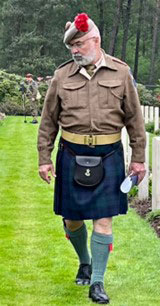
Bruno Plourde - How to adapt to life after service
The greatest challenge for a Canadian Armed Forces (CAF) member transitioning to life after service is social adaptation, says Lieutenant-Colonel (Retired) Bruno Plourde.
After four decades and three overseas deployments as a reservist, Bruno released from service in 2020. He went on to play a key role in developing Le Sentier/The Trail, which offers personalized support and assistance to Canadian Veterans in transition.
With that experience, Bruno has valuable advice for CAF members approaching transition or Veterans. Read it all in his Veteran story.
Do you have a story to share about experience in the Canadian Armed Forces? Tell us about it by email.
Commemoration
Southern Chiefs Organization invites you to celebrate and support First Nations Veterans
Southern Chiefs’ Organization (SCO) is seeking First Nations Veterans to be added to their online Veterans Wall of Honour. If you know a Veteran, please contact them by email.
This digital commemorative space recognizes the bravery, sacrifice and achievements of Veterans from 34 Anishinaabe and Dakota First Nations.
The Southern Chiefs Organization is based in southern Manitoba, and comprises over 30 First Nations. As a 2022–23 Veteran and Family Well-Being Fund recipient, the organization is actively involved in supporting Veterans through their First Nations Veterans Program.
The SCO Veterans Program connects First Nations Veterans with VAC benefits and programs and provides cultural healing support. With a community-building mindset, this group has established a supportive environment for Veterans to come together and share their stories.
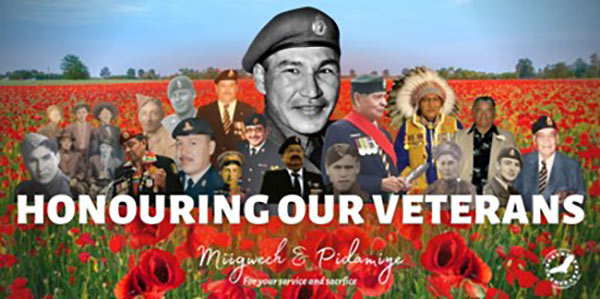
Vimy Ridge Day
Earlier this month marked 107 years since the Battle of Vimy Ridge, an important moment in Canadian history. From 9 to 12 April 1917, soldiers from all four Canadian divisions fought side-by-side for the first time during the First World War.
The Battle of Vimy Ridge is one of Canada’s most celebrated military victories, but one that came at a heavy cost. Nearly 100,000 Canadians served there, with more than 10,600 becoming casualties and nearly 3,600 being killed.

29th Infantry Battalion advancing over No Man's Land through the German barbed wire and heavy fire during the Battle of Vimy Ridge. Source: Library and Archives Canada.
Today, we continue to remember and recognize their bravery and sacrifice. The Canadian National Vimy Memorial, built at the highest point of Vimy Ridge, stands as a tribute to all Canadians who served during the First World War. Carved on the walls of the monument are the names of 11,285 Canadian soldiers killed in France during the First World War, and whose final resting places were then unknown.
The sacrifices made more than a century ago help allow us to enjoy the lives we live today.
Lest we forget.

Canadian National Vimy Memorial.
Countdown to the 80th anniversary of D-Day

For the Canadians who crossed the English Channel to Juno Beach, 6 June 1944 was a day they would never forget.
Harold Tilley was one of them.
That was D-Day, when some fourteen thousand Canadians joined Allied forces to storm beaches in Normandy, France. It took the Allies several months to prepare for and coordinate the attack, making it the largest combined military operation of all time.
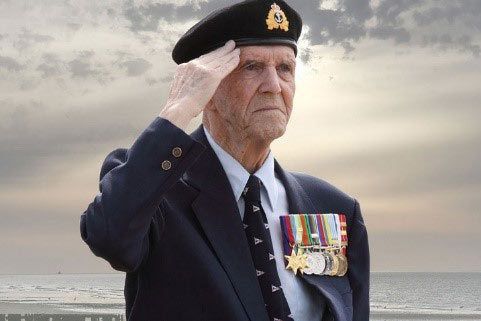
Tilley was one of the 10,000 Canadian sailors who risked their lives as a part of Operation Overlord—more commonly known as D-Day. Regrettably, his unit’s landing on Juno Beach did not go as planned.
As we count down to the 80th anniversary of D-Day, the Canada Remembers social media channels will highlight Canadians like Mr. Tilley who took part in the heroic campaign to liberate Western Europe.
Thousands of faces…thousands of stories. Stories about men, and about women. During the Second World War, the Canadian Women’s Army Corps (CWAC), the Women’s Royal Canadian Naval Service (WRCNS) and the Royal Canadian Air Force – Women’s Division (RCAF–WD) were established.
In the coming months, events across Canada will lead up to the signature ceremonies of D-Day and the Battle of Normandy on June 6 in Moncton, New Brunswick, and at the Juno Beach Centre in France.
Learn more about the road to D-Day 80.
RCAF celebrates centennial
On 1 April 2024, buildings around the world were illuminated in blue to mark the Royal Canadian Air Force’s (RCAF) 100th anniversary, including the Canadian National Vimy Memorial.
Since its beginning as a distinct military element in 1924, hundreds of thousands of Canadians have bravely served their country as members of the RCAF.
This year, and every year, we honour their sacrifices and achievements, and the important role the RCAF has played for Canada abroad and at home. During 2024, Veterans Affairs Canada, as well as partners, will also honour 100 years of bravery and achievement of the RCAF. You can find more about these events at the RCAF 2024 Centennial page.
Last month, the Royal Aviation Museum of Western Canada unveiled a commemorative exhibit featuring 100 years of trailblazing and heroic achievements of RCAF members. The exhibit will be featured at the museum until 30 June 2024.

Attendees at the unveiling event of commemorative panels for the 100th anniversary of the Royal Canadian Air Force (RCAF) at the Royal Aviation Museum of Western Canada, in Manitoba. Photo source: 17 Wing Winnipeg Imaging Section
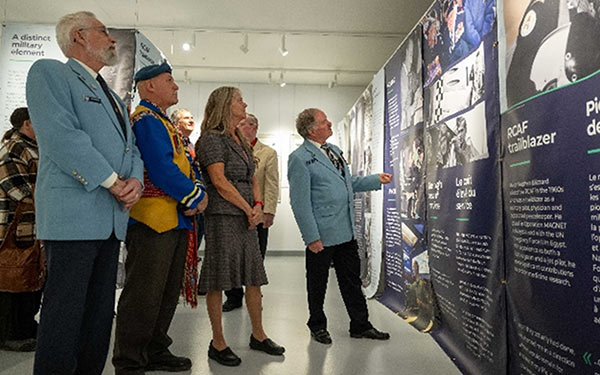
International Day of Reflection on the 1994 genocide against the Tutsi in Rwanda
Canadians served as part of United Nations peacekeeping missions in Rwanda from 1993 until 1996. More than 600 Canadian peacekeepers served there both before and following the genocide against the Tutsi ethnic group. UN peacekeepers were unable to stop the worst of the violence and Canadian Armed Forces members tried to restore order. They delivered much needed humanitarian aid and other assistance to the country.
Earlier this month, Veterans who served in Rwanda, alongside members of the public, attended a ceremony to mark the International Day of Reflection on the 1994 Genocide against the Tutsi in Rwanda. We continue to remember the resilience of the survivors and recognize the hundreds of Canadian peacekeepers who served there.

A ceremony was held on 7 April 2024, at the National Peacekeeping Monument (The Reconciliation).

Major (Ret’d) Daniel Gagnon recites the Act of Remembrance during the ceremony.
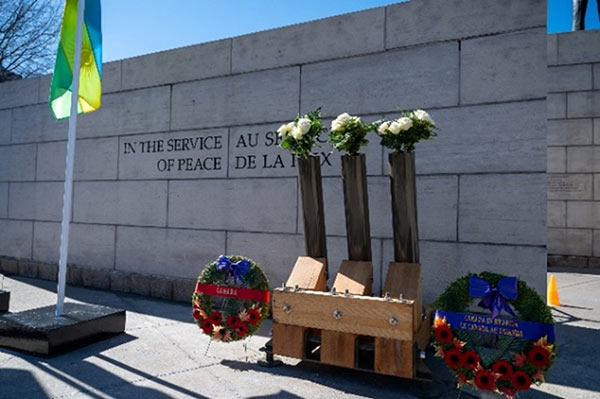
Wreaths and flowers placed at the National Peacekeeping Monument during the commemorative ceremony.
First of its kind Veterans delegation commemorates 2SLGBTQI+ soldiers who served in First World War
From April 6 to 9, 2SLGBTQI+ Veterans participated in an overseas commemorative program to honour the contributions of those who served in the First World War, in the lead-up to the 107th anniversary of the Battle of Vimy Ridge. The delegation, composed of representatives from Rainbow Veterans of Canada and the LGBT Purge Fund, was the first of its kind.
The group followed in the footsteps of those who served across the battlefields of Europe. Along the way, they shared stories of 2SLGBTQI+ people who served in the First World War. This included the story of Ellanore Parker and Murney Pugh, nurses who served together treating wounded soldiers in France and lived together after the war. Also, Frederick Hardy was sentenced to hard labour in 1916 for charges relating to his sexuality and later died in the Battle of Hill 70. He is one of many individuals who contributed to the war effort despite being discriminated against for simply being themselves.
The delegation included visits to key commemorative sites in Belgium, including the Passchendaele Canadian Memorial, St. Julien Canadian Memorial, and the John McCrae Memorial. In France, the delegation visited the Beaumont-Hamel Newfoundland Memorial as well as the Hill 70 Memorial. The delegation concluded their visit on April 9 when representatives visited Frederick Hardy’s engraved name on the Canadian National Vimy Memorial, in a ceremony marking the 107th anniversary of the Battle of Vimy Ridge.
The Honourable Ginette Petitpas Taylor, Minister of Veterans Affairs and Associate Minister of National Defence, joined the group for commemorative activities on April 6 before returning to Ottawa. While in Europe, she met serving CAF members at Lydd Training Camp, pensioners at the Royal Hospital Chelsea, including Canadian Wayne Campbell, who served in both the Canadian and British armies. She then met with NATO officials and Belgium’s Minister of Defence, Ludivine Dedonder.
This program is an important step in recognizing and amplifying the stories of 2SLGBTQI+ service members while shedding light on the discrimination they experienced while protecting our country. To learn more about the military contributions of Canada’s 2SLGBTQI+ community, visit our Pride in service web page.
Commemoration calendar
- May 3:
- John McCrae wrote “In Flanders Fields” during First World War, 1915
- May 4:
- Canadian Navy officially created, 1910
- May 5:
- The 10th Battle of the Atlantic Sunday, honouring those who perished at sea during the Battle of the Atlantic
- May 5:
- German forces in the Netherlands officially surrendered to the Canadians, 1945
- May 8:
- Victory in Europe (V-E) Day, official end of Second World War in Europe, 1945
- May 21:
- 85th anniversary of the dedication of the National War Memorial in Ottawa, 1939
- May 28:
- Canada’s “Unknown Soldier” was laid to rest in Ottawa, 2000
- May 29:
- International Day of United Nations Peacekeepers
Engagement
Women Veterans share challenges, successes at annual Forum
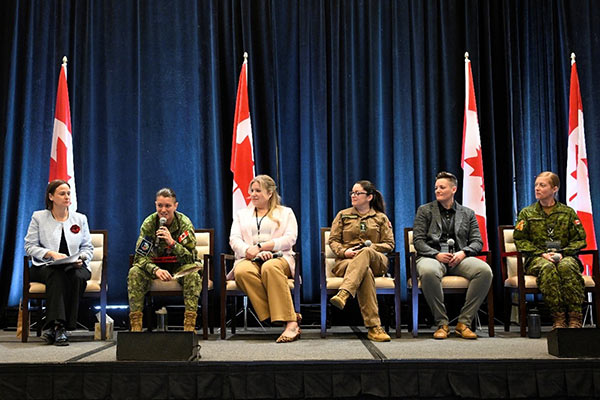
Women Veterans shared powerful stories about health, homelessness, recognition, access to services after military service and more during the annual Women Veterans Forum in Montreal, Quebec, on March 7 and 8. Coinciding with International Women’s Day, the community-led forum was an opportunity for Veterans, community organizations, subject matter experts and government departments to share their experiences and perspectives with the goal of achieving greater equity.
In addition to challenges, the attendees also shared many inspiring stories, highlighting the strength and perseverance of the women Veteran community. Many themes emerged, including the importance of bringing women Veterans together to connect on shared experiences and advocate for one another.
Women Veterans also shared ideas on how VAC can improve women’s experiences as they relate to VAC services and support. Key to continuing this conversation will be the creation of a new Women Veterans Council, which Minister Petitpas Taylor announced at the Forum. VAC will work collaboratively with the Council, empowering members to provide advice and innovative solutions to the Minister. Council members will be women who are currently serving or have served in the Canadian Armed Forces or Royal Canadian Mounted Police.
A full report will be available on our website in the coming months—stay tuned.
National Stakeholder Summit brought together Veterans and stakeholders

Saskatchewan First Nations Veterans Association (SFNVA) elected Grand Chief Robin Dawatsare
On March 5 and 6, over 200 participants gathered to discuss topics like recognition for modern Veterans, supports for military spouses and families, homelessness, transition to life after service, mental health and Veteran employment. The Summit included Veterans, representatives from Ministerial Advisory Groups, stakeholders, community partners and government officials, who met to learn from each other during Veterans Affairs Canada’s first in-person National Stakeholder Summit in five years.
Over the course of the four days, Minster Petitpas Taylor joined Veterans and organizations to learn about their experiences, supports and how VAC can work to better support Veterans and their families. The Summit was an opportunity to hear the unique challenges Veterans face, as well as gaps in existing support and services. Participants shared ideas about how we can better address these challenges together at VAC and among the broader stakeholder community.
Also discussed at the Summit was the launch of a National Veteran Employment Strategy, which is slated for later this year. The Strategy will aim to ensure all Veterans find meaningful work upon release from the CAF.
Conversations from the event continue, with more work underway to address key comments. A learning report is being prepared and will be available on our website and social media channels.
Do you know other Veterans, family members or others who would benefit from the information in this newsletter? Feel free to share it with them.
